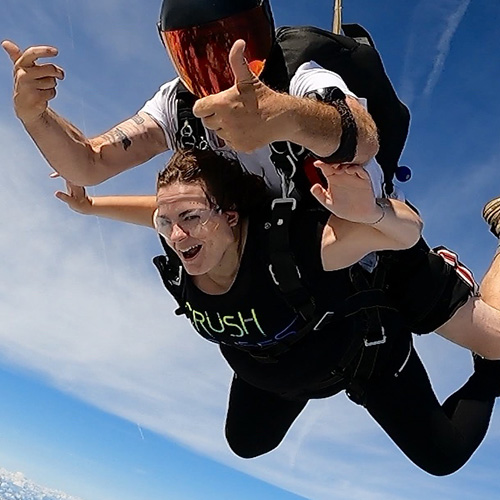Bethany was running in a half marathon when she began to feel ill. She thought that her celiac disease may have flared up due to something she had eaten, but when she didn’t get better, she decided to see a doctor. What followed was a series of misdiagnoses, including depression and irritable bowel syndrome. She was even asked if she was making herself sick. Eventually, a CT scan revealed a spot on her appendix, and an MRI a month later resulted in an appendectomy. Bethany’s doctor called her after the procedure to inform her that the spot on her appendix was neuroendocrine cancer, but they had removed it all and she had nothing to worry about. Bethany was skeptical about the news and wanted to get a second opinion about the state of her health. She went to see a specialist, where she received a gallium PET scan that revealed tumors on her pancreas and liver. She had a rare, stage 4 neuroendocrine cancer.
Bethany was shocked and angry after receiving her diagnosis. If she hadn’t advocated for herself and gone to see another doctor, she might not have made it much longer. From that point on, Bethany made it a point to interview every medical specialist she spoke with to decide if she would allow them to treat her. It was her body, and she knew best.
The odds that Bethany would survive weren’t great; she was diagnosed at a late stage, and the estimated five-year survival rate was around 25%. She wanted to remove the largest amount of cancer from her body as possible. Her treatment plan consisted of four months of hormone therapy, and then a second surgery to resect part of her liver and remove some lymph nodes. Bethany knew that despite going through treatment, her cancer would come back at some point in her lifetime, and she continued to receive gallium PET scans to monitor the growth of cancer cells in her body.
While Bethany was going through the treatment process, her partner at that time, family, and friends were there for her. She also recalls speaking with support groups. “Talking to other people who have experienced cancer made me feel so much less alone.” She became a member of the young adult cancer program where she was receiving treatment, and she started going to therapy to help with her feelings of anxiety and with the physical and emotional process of cancer treatment. She also had a friend and coworker who also had neuroendocrine cancer, who became a pillar of support for her.
One of the most difficult parts of Bethany’s experience was finding the right medical team. She had a lot of negative experiences and interactions with doctors, insurance companies, and other members of the medical community. Bethany holds the belief that she is alive today because she is so stubborn. She wasn’t afraid to tell her doctors when they were wrong and didn’t hold back when she needed to advocate for herself. Her insurance company denied the PET scan that found the cancer in her pancreas and liver; they didn’t deem it medically necessary. She made sure to get multiple opinions, and she utilized the resources and organizations that were in her area that were willing to provide help and information. Bethany also read scientific journals to learn more about her disease.
In December 2021, Bethany’s doctor found a spot on her pancreas. While this was extremely difficult news to hear, it was not unexpected, and she has refused to allow it to stop her from living life to the fullest. She struggles with planning past her next PET scan, and she sees a therapist on a weekly basis. She has acknowledged that she’ll never be the speed runner that she was in the past, she knows that she isn’t the same person she was before her cancer diagnosis, and she’s learned to live her life without worrying about what other people are doing or thinking. She also reads a lot of books now; her most recent find was Between Two Kingdoms, written by a young adult cancer survivor.
With a foot-long scar on her stomach and PET scans every few months, Bethany is constantly reminded of her experience, and her outlook on life has drastically changed. For her three-year cancer anniversary, she celebrated by going skydiving. She doesn’t wait for things to happen anymore; instead she makes them happen. She got involved with an adult cancer outdoor adventure group called First Descents, and she has gone rock climbing, rappelled down mountains, participated in roller derby, has plans to go skiing and snowboarding soon, and joined the steering committee for the National Coalition for Cancer Survivorship (NCCS). She also joined two cancer support groups: Cactus Cancer Society and Stupid Cancer. Bethany doesn’t know how much time she has left, but she wants to use it to the fullest, without living in fear.
Bethany’s life goal is to be happy, and she wants others in similar situations to know that they are not alone, and that help is available. “There are so many resources and amazing people doing amazing work. Whatever it may be, there is a group of people out there who will [understand].”

Image: Bethany
There are so many resources and amazing people doing amazing work. Whatever it may be, there is a group of people out there who will [understand].”

